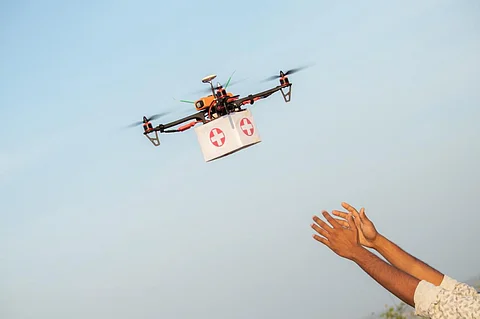

The Indian Council of Medical Research (ICMR) released guidelines for drone use in the healthcare sector to ensure access to medicines, vaccines and other paraphernalia to all, especially in the geographically difficult terrains in the country.
The move was based on an October 2021 pilot project conducted in Manipur and Nagaland, where COVID-19 vaccines, vaccines for routine immunisation programmes such as measles, mumps and rubella, antenatal care medicines, multi-vitamins, syringes and gloves were delivered.
The guidelines were released on June 2 during the Bharat Drone Mahotsav 2022 in Delhi. It was based on field experience, which included an indegenious drone transporting COVID-19 vaccines in 12-15 minutes over an aerial distance of 15 kilometres from Manipur’s Bishnupur district hospital to a primary health centre in Loktak lake, Karang island.
Union health minister Mansukh Mandaviya said in 2021:
The actual road distance between these locations is 26 km. Today, 10 beneficiaries will receive the first dose and eight will receive the second dose at primary health centres.
The guidelines, which were preceded by the New Drone Rules, 2021 — lauded for making it cheaper and easier to operate drones — detail the regulatory approvals required to carry out such projects, what type of drones will be needed as well as what the ideal take-off and landing sites should be.
“On the policy, regulatory and incentive fronts, the government has simplified the process as much as possible,” Amber Dubey, joint secretary, Union Ministry of Civil Aviation, told Down To Earth.
“Many progressive state governments are now coming up with budgetary grants and tenders for drone services. The drone industry is designing customised drones that meet the terrain and weather related challenges in different states especially the hill states and North East Region. The Ministry of Civil Aviation will continue to provide full support to states and industry, wherever required,” he added.
The COVID-19 pandemic has highlighted fissures in the healthcare supply chain across the world and India is no exception. As per Our World in Data, 72.61 per cent of the population has either fully or partially completed their vaccination protocol as of June 2.
The World Economic Forum’s (WEF) Medicine from the Sky initiative is another ongoing programme which aims to bridge this gap. Only 30,000 government-run primary healthcare centres cater to nearly 1.4 billion people in the country. Moreover, 5-10 per cent of these are not accessible to the suppliers and patients because of difficult terrain, Suresh Munuswamy, head of technological innovations at the Public Health Foundation of India told Fortune. This highlights the need to ensure last-mile delivery of essential treatments, vaccines and other medical supplies.
“Drones have tremendous potential to deliver vital goods to vulnerable populations, overcoming access barriers and enabling faster delivery of lifesaving medicine. However, concerns about privacy, safety and security have overshadowed the potential of drones to transform legacy industries and systems,” WEF noted.
Taking lessons from the drone delivery efforts in Ghana and Rwanda for medical supplies, 300 vaccines were delivered to remote areas in Telangana under the Medicine from the Sky initiative.